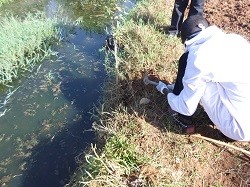Reinterpreting the ancient oil lamp
Olive oil production has been a tradition in southern Europe for millennia, although it may not have been used for energy per se. Today, there are modern methods for recycling residues and producing bioethanol for energy from this elixir of life. The EU-funded Etoile (′Bioethanol production via lignocellulosic fermentation of olive oil residues′) project is developing a new process where olive mill wastewater from traditional three-phase centrifugation is purified, yielding valuable enzymes at the same time. These 'cellulase enzymes' are then combined with the olive residues, such as pulp and husks, to obtain ethanol, creating a viable alternative to the growing bioethanol (clean fuel) industry. The research envisaged will thus provide a viable alternative to the bioethanol industry which is seeking new cost-effective production processes that are competitive with the fuel industry. To achieve its goals, the project will seek to address many issues such as developing efficient, cost-effective and eco-friendly pretreatment for solid residues of olive oil extraction. It must identify a robust micro-organism that transforms sugars into ethanol quickly and is highly ethanol tolerant. Cellulase enzymes account for 40% of the ethanol production costs and must be kept down. Ways must also be found to manage the wastewater from olive mills, which is normally highly polluting. The project team is currently developing a more efficient fermentation process for ethanol. It is exploring ways to treat wastewater from olive mills and recycle the enzymes so as to reduce their costs per litre of ethanol. In addition, researchers are developing a pretreatment process for olive oil residues which does not require expensive chemicals and/or costly high-pressure equipment. This also involves ethanol-recovery process design and optimisation to keep fermentation rates high and increase the production rate of ethanol by 20%. The project has an ambitious objective to develop a pilot-scale bioethanol production plant that can achieve a 30-40% reduction in fuel consumption and energy costs. The likelihood of success is high and will offer another excellent method to extract ethanol, promote eco-friendly fuel and make use of olive oil residue in all olive-growing European countries, and is likely to spread to other Mediterranean regions such as the Near East and Africa in the future.







